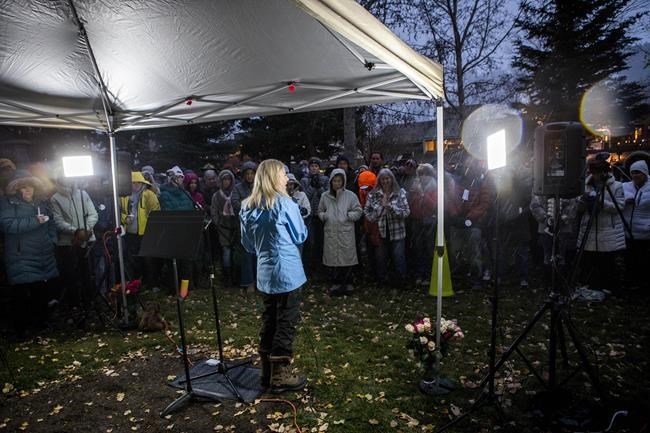
Speaker Tiffany Talbott addresses the crowd about the life and loss of grizzly bear No. 399 at a candlelight vigil in Jackson, Wyo., Saturday, Nov. 2, 2024. (AP Photo/Amber Baesler)
Republished November 02, 2024 - 8:32 PM
Original Publication Date November 01, 2024 - 9:06 PM
During her nearly three decades roaming the snowy wilderness of the Teton Range, Grizzly No. 399 became a beloved mama bear with millions of parkgoers following her yearly adventures and her ever-growing family tree.
Nature lovers are mourning the matriarch of the world-famous bear family after she was fatally struck by a vehicle Oct. 22 on a highway in western Wyoming. Dozens braved frigid weather in the picturesque ski town of Jackson on Saturday night to attend a candlelight vigil watched by some 1,300 others online.
Wildlife guide Bo Weldon told the gathering the community was going to “pingpong through the stages of grief” but that was what they needed to do despite the difficulty.
"We are terrible and crushed by this, but we’re here together," Weldon said as attendees huddled close in the wet, cold rain.
A PBS documentary crowned the 28-year-old grizzly “Queen of the Tetons” and an Instagram account dedicated to her has amassed more than 60,000 followers. She was known for frequenting tourist-heavy spots and roadsides in Grand Teton National Park and became an ambassador for her species and a symbol for people working to conserve American public lands.
Named for the tag affixed by researchers to her ear, No. 399 was the oldest-known reproducing female grizzly in the greater Yellowstone ecosystem. She has been credited for helping the region’s grizzly population rebound from just over 100 in the 1970s to around 1,000 today.
She had 18 known cubs in eight litters over the years, and some have been spotted with cubs of their own.
Her ashes were spread this week in the Pilgrim Creek area of Grand Teton National Park, where she spent much of her life, park officials said.
Jacob Krank, the master of ceremonies, shared how he encountered No. 399 the first time he drove into the park to explore it 13 years ago. Suddenly he saw “this beautiful grizzly bear” in the road with her two cubs. She was so near he could hear her breathing and paws scratching the ground.
“She looked right at me, just right in the eye. It was just such a profound experience,” he said. “It was as though she was saying, ‘Welcome home. Where have you been all this time?’”
Krank said the ceremony came together in response to popular demand. When No. 399 died, people began posting social media inquires and asking at The Mangelsen Images of Nature Gallery in Jackson, where Krank works, which features photos by Thomas Mangelsen, one of the best-known photographers of the bear.
Attendees observed a moment of silence and listened to a rendition of “What a Wonderful World” by Louis Armstrong while trying to keep the wind and rain from extinguishing their candles.
“399 will always be part of this special place,” Grand Teton National Park Superintendent Chip Jenkins said in a statement. “However, there is still work to do to ensure her descendants and all grizzly bears continue to thrive in the greater Yellowstone ecosystem. It’s up to all of us to make sure they do.”
Grizzlies have teetered on and off the endangered species list. They remain federally protected, but some state officials in Wyoming, Montana and Idaho have sought to remove federal protections as their population has replenished. The states want to regain management of grizzlies and allow limited hunting.
Conservationists argue the species still requires protection as food scarcity caused by climate change has driven grizzlies further from their habitats in search of food.
On his tours of the Tetons, wildlife guide Jack Bayles said he often draws attention to barren huckleberry bushes affected by rising temperatures, which he said might help explain why No. 399 was about 40 miles (64 kilometers) south of her habitat in the park when she was fatally struck. Grizzlies need to eat nearly nonstop in the fall to store enough fat to sustain their winter hibernation.
A male yearling cub, known informally as “Rowdy” or “Spirit,” was with No. 399 when she was killed and has not been located in the nearly two weeks since.
“There is no indication it was struck in the collision,” Joe Szuszwalak of the U.S. Fish & Wildlife Service said. “Given the bear’s age and the time of year, the yearling has a strong chance of surviving independently, and there are no current plans to capture it.”
On average, about three grizzlies are killed in vehicle collisions in the greater Yellowstone ecosystem each year, according to data collected by researchers and released by the park. No. 399 was the second grizzly killed in the region by a vehicle this year.
Law enforcement officers have declared the bear's death an accident. The driver was not speeding and was not hurt.
News from © The Associated Press, 2024